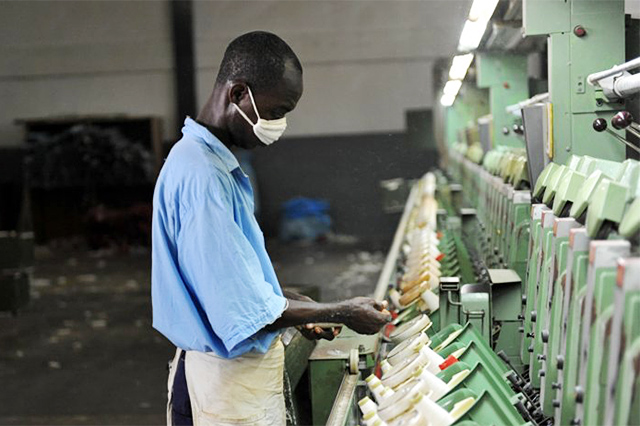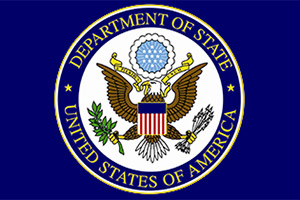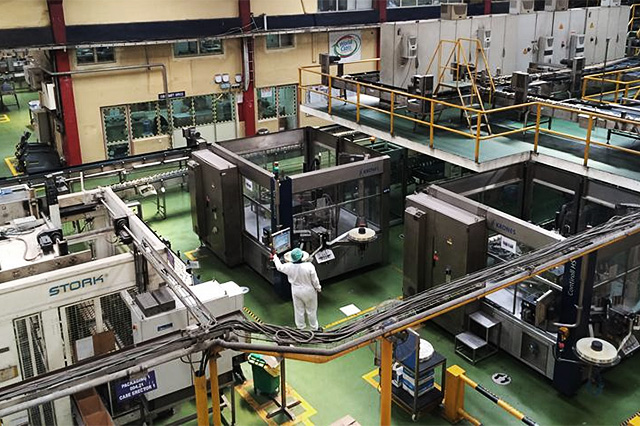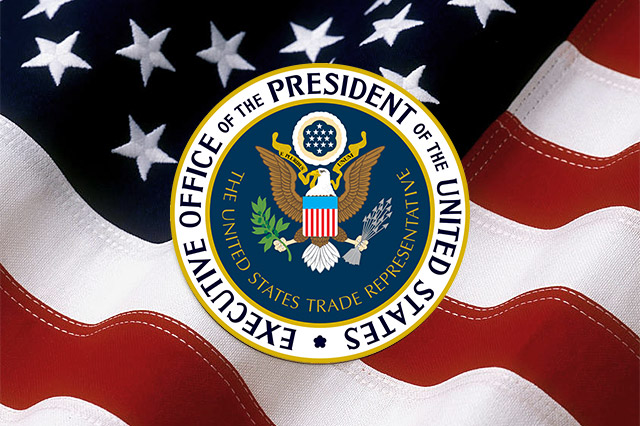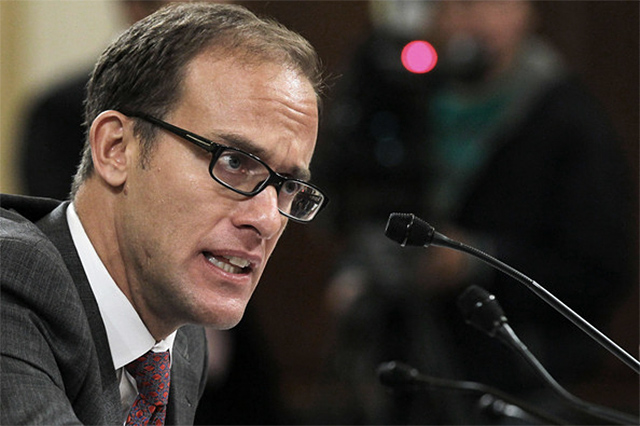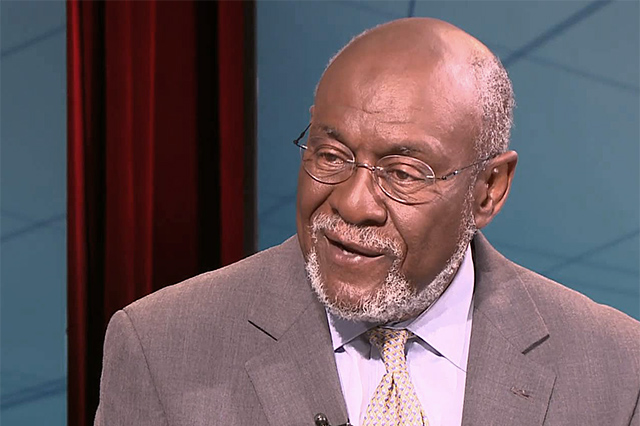Africa Media Hub - telephonic press briefing with US Dep Asst Sec of State Peter Haas [incl. transcript and sound file]
EVENT:
Please join us on Tuesday, August 21 at 09:00 EDT/13:00 GMT/15:00 CAT for a telephonic press conference with State Department Economic and Business Affairs Deputy Assistant Secretary of State for Trade Policy and Negotiations, Peter Haas where he will preview his travel to South Africa and Ethiopia to promote agricultural innovation, science-based regulatory policy, and increased trade.
Mr. Haas will participate as a speaker at the first ever BIO Africa Convention in Durban alongside science and trade ministers from across Africa.
He will then travel to Ethiopia to meet with officials from the Government of Ethiopia and the African Union to discuss trade and agricultural cooperation.
DETAILS:
Speaker: Deputy Assistant Secretary of State for Trade Policy and Negotiations, Peter Haas
Date: August 21, 2018
Time: 0900 EDT/1300 UTC/1500 CAT
* Please use Time Zone Converter to determine the start time of the event in your time zone.
Language: English. French interpretation will be offered.
Ground rules: On the record
Dial-in Info: To be provided once you RSVP
RSVP: RSVP to This email address is being protected from spambots. You need JavaScript enabled to view it.. Please indicate if you will dial in (specify
English/French, or request that we dial out to you (provide the phone number and language to be used).
Twitter: We will use #AFHubPress as the hashtag for the call. Follow us on @AfricaMediaHub.
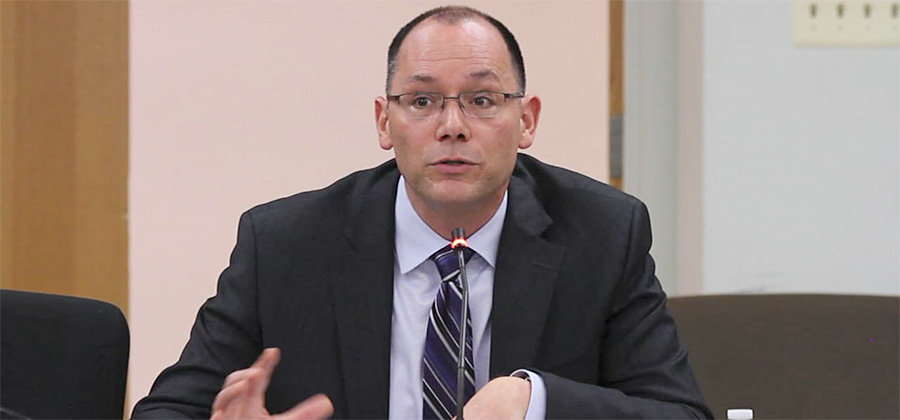
LOGISTICS:
- Callers should dial-in to the conference call 10-15 minutes early.
- When an individual journalist dials-in, the operator will collect the caller’s name, press affiliation, and location. When an embassy dials in, the operator will ask the embassy’s name and location.
- The moderator will facilitate the Q and A among the connected callers. Journalists on the conference call will be instructed to press the “*” and “1” buttons on their phones in order to enter the question queue. NOTE: You can press “*1” at any time during the call to join the question queue, even before the moderator begins the Q and A portion. We ask that journalists limit themselves to one question. Journalists can also submit questions in English to This email address is being protected from spambots. You need JavaScript enabled to view it. prior to or during the call.
Biography of Peter Haas:
Peter Haas is the Deputy Assistant Secretary for Trade Policy and Negotiations in the Bureau of Economic Affairs. He previously served as Chargé d’Affaires and Deputy Permanent Representative at the U.S. Mission to the Organization for Economic Cooperation and Development (OECD).
Mr. Haas has also served as the U.S. Consul General in Mumbai, India, and Economic Counselor at the U.S. Embassy in Jakarta, Indonesia. Other diplomatic postings include London, Rabat, Washington, Port-au-Prince, and Berlin.
Mr. Haas holds a BA in International Studies and German from Illinois Wesleyan University. He attended the London School of Economics as a Marshall Scholar, where he earned MSc (Econ) degrees in both the Politics of the World Economy and Comparative Government.
Additional Resources:
- Website: Bureau of Economic and Business Affairs
- Follow along on Twitter: @EconAtState
Post-event Transcript
OPERATOR: Ladies and gentlemen, thank you for standing by. Welcome to the trade policy conference call. At this time all participants are in a listen-only mode. Later we will conduct a question and answer session; instructions will be given at that time. If you should require assistance during the call, please press * then 0. As a reminder, this conference is being recorded. I would now like to turn the conference over to your host, Brian Neubert. Please go ahead.
MODERATOR: Good afternoon to everyone from the U.S. Department of State’s Africa Regional Media Hub. I would like to welcome our participants dialing in from across the continent and thank you for joining today’s discussion. We are very pleased to be joined by Mr. Peter Haas. He is Deputy Assistant Secretary for Trade Policy and Negotiations in the Bureau of Economic Affairs at the State Department. Mr. Haas will preview his travel to South Africa and Ethiopia to promote agricultural innovation, science-based regulatory policy, and increased trade. Mr. Haas will participate as a speaker at the first ever BIO Africa convention in Durban, alongside science and trade ministers from across Africa. Mr. Haas joins us from Washington D.C.
We will begin today’s call with opening remarks and then we will turn to your questions. We will get to as many of them as we can during the call. You must press *1 to join the question queue. You can also join the conversation on Twitter, using #AFHubPress, and you can follow us @AfricaMediaHub. As a reminder, today’s call is on the record, and with that, let me turn it over to you, Mr. Haas. Go ahead, sir.
HAAS: Thank you very much, Brian, and good afternoon to everyone. As Brian said, I’m Peter Haas, I’m the Deputy Assistant Secretary for Trade Policy and Negotiations at the U.S. Department of State. I’d like to thank you all of you for taking time to call in to learn about my upcoming trip to South Africa and Ethiopia from August 27th to the 31st and about the State Department’s economic engagement with Africa. I’d like to give you an overview of my trip and what I’m hoping to accomplish. And then, as Brian said, I’m happy to take questions.
The main reason I’m traveling to Africa is to represent the United States at the first ever BIO Africa convention in Durban, South Africa. As Brian said, the convention will draw researchers, scientists, businesses, and policymakers from around Africa and beyond. We’ll be discussing the promise of biotechnology for agriculture, health, and many other sectors in Africa.
I think all of you know that biotechnology allows for intentional changes in plants or animals to improve outcomes in agriculture or health. So that’s a rather technical description, but to make it more accessible, it’s about how you can make plants so that they’re more naturally resistant to pests - for example, the fall armyworm; other diseases; or how you can change plants so that they produce enough Vitamin A to combat blindness across the continent. Good policies and science-based regulations allow farmers the choice to plant these, while simultaneously ensuring public safety and allowing these innovations to reach consumers.
I’ll be talking with policymakers, researchers and business. We’ll be focusing on how to work together to make sure Africa benefits from these new technologies, while increasing opportunities for trade. I’ll be speaking on two panels. The first is about understanding what the barriers to agricultural biotechnology are in Africa. For that panel, I’ll be joined by a journalist, a farmer, a South African policymaker, and an executive from a public sector product developer. We’ll be discussing the challenges from public perception to policy and lack of investment. I’m hoping we can provide a clear picture of the barriers and how we can overcome them.
The second panel I’ll be participating on will be with senior government officials, and we’ll be talking about how to develop regulations and policies that support biotechnology and its potential for agriculture, health, and other sectors. I’m really looking forward to participating in BIO Africa and would like to thank Dr. Siyabulela and his team alongside the government of South Africa for their work in organizing this groundbreaking event.
In Durban, I’ll also be meeting with leaders from the South African businesses to discuss current challenges and opportunities with the African Growth and Opportunity Act and priorities for our trade relationship beyond this. From here out, I’ll be referring to the African Growth and Opportunity Act as AGOA, which is the abbreviation.
AGOA gives South Africa and other eligible African countries duty-free access on thousands of products to the U.S. market and offers increased opportunities for the U.S. private sector by strengthening links with African markets. I’m eager to hear from these business leaders how we can build on the already strong economic ties between our two countries and increase trade.
After my time in South Africa, I’ll be traveling to Addis Ababa to meet with officials from the government of Ethiopia and the African Union. I’ll also visit a Feed the Future project site to see America’s initiative to combat global hunger. I’ll be meeting with Ethiopian government officials to discuss America’s strong economic ties with Ethiopia, including under AGOA, and how we can strengthen them. We are encouraged by the leadership of the new Prime Minister and look to build on this momentum.
We are also targeting meetings with the African Union to discuss the future of the U.S.-Africa trade relationship. Finally, I’ll be visiting a Feed the Future-supported company outside of Addis Ababa to learn more about how U.S. government support is strengthening the Ethiopian agriculture sector and contributing to increased economic growth, food security, and resilience.
The company I’m visiting is called the Shayashone Company. They produce a product called PICS Heretic Bags. Basically these are bags that allow you to package produce so that it lasts longer, and thereby reduces food waste and increases access to nutritious foods for consumers and income for farmers.
The fact that I will be visiting such a broad cross-section of officials and projects speaks to the importance and strength of the U.S.-Africa relationship. The U.S. government remains deeply committed to increasing food security in Africa by embracing technology, modernizing policies, and increasing trade. This trip reaffirms that commitment and America’s deep and enduring economic, political, and scientific relationship with Africa.
Those are my prepared remarks, and now I’m happy to take any questions you might have.
MODERATOR: Thank you, Mr. Haas. We will indeed turn to the question and answer portion of today’s call. For those asking questions, I’d ask you to state your name and media affiliation, if you would, before asking your question, and again the topic is trade and agricultural cooperation to the United States and Africa, as well as the upcoming trip that Mr. Haas will have in South Africa and Ethiopia.
If you are listening to the call in English, you can press *1 on your phone to join the question queue. As we’ve said in the past, if you’re using a speakerphone, you may have to pick up the handset. We can also take questions on Twitter @AfricaMediaHub, as well as in English via email to This email address is being protected from spambots. You need JavaScript enabled to view it..
Let’s go to Mr. Kevin Kelley. If you could open the line, Greg, for our first question.
OPERATOR: Your line is open, please go ahead.
QUESTION: Yeah, hi, thanks for doing this. I’m Kevin Kelley, I’m based in New York and I’m the U.S. and UN Correspondent for the Nation Media Group in Kenya. I have two questions but I’ll just ask one now and hope that I can come back later with one that will be longer in my posing of it.
For right now I’d like to see if you could possibly give us an update on efforts to combat the fall armyworm, which as far as I heard in the recent past is causing severe damage to corn crops - maize crops - in east Africa at least, maybe in other parts of the continent as well. How is that effort to curb, to constrain, the fall armyworm going? I know that USDA and I think the State Department are playing a role in this. Okay, thank you.
HAAS: Thank you very much for the question. As you mentioned, USDA and USAID are actively involved in coordinating across the countries in Africa to be able to look at the problem, to provide technical assistance where appropriate.
In the U.S. government, we’ve created an interagency task force to be bringing together all of the resources of not only USDA and USAID, but also the State Department and other parts of the government, to look at ways that we can assist in this issue.
One of the aspects and one of the links that I’ll be making during my trip is the importance of including biotechnology as part of the efforts to constrain the spread of the fall armyworm. There have been already developed varieties and events, as they’re called, that are resistant to the spread of the fall armyworm, and they’ve been tested and they’re safe. In many instances, what we really need is the regulatory environment to allow those strains and those events to be used. We, in fact, use them here in the United States to great effect as a way to prevent the spread of fall armyworm.
And so to sum back up, it’s a combination of us working with local governments throughout Africa, the creation of a task force here in Washington to coordinate, and also working to encourage the use of bio-tech products which have been proven and used in the United States to combat the spread of fall armyworm. Thank you.
MODERATOR: For our next question we’ll turn to Twitter. The question is: In light of what appears to be lack of adoption of agricultural biotech in African countries, can you comment on why that is and what your work and your visit can do to increase some of that application?
HAAS: Thank you. So we’re very encouraged, actually, by the progress that we’re seeing, and so I do think as a starting point that the take-up of genetically-engineered products has been relatively slow, but we’re encouraged by the increasing use of them throughout the continent. I think Ethiopia is a good example of one of the countries that has started to use them.
I would also note that probably half of the world’s biotechnology production occurs in developing countries: India and the Philippines are huge examples of countries that use biotech rice in order to increase yields and to reduce the amount of resources that they use.
In many cases, the issue is simply the ability to create a regulatory environment that looks at the science behind it and looks at whether these products are safe, both to plant, to grow, to consume, and to use, and the important thing is to note that study after study, whether it’s EU regulators, whether it’s U.S. regulators, whether it’s regulators in the Philippines and everywhere else, they have all almost unanimously determined that these products are safe, and that they’re effective, and that they do what they’re supposed to do.
And so I think that the main thing, and what I’ll be seeking to do while I’m there, is both to educate about the safety of the products, but then also about the importance of having a sound regulatory environment that looks at the science. Of course, it remains every country’s choice what they decide to do, but what we’ve found is that those countries that choose to use - including the United States, where, for example, over 90% of our soybeans are genetically-engineered - that countries that choose to use these end up with higher yields, more nutritious food, they use less resources, and it increases food security and the availability of food for people.
I guess the other thing that I would add is that of the 18 million farmers that use genetically-engineered plants and animals, that the vast majority of those are smallholder farmers, who really truly can see their bottom line and their income increase by the use of these products.
MODERATOR: As a reminder to our participants, you can press *1 on your phone to join the question queue. While we wait for more of you to do so, I have another question that’s come to us at the Media Hub by email. You mentioned, Mr. Haas, AGOA. Of course, the AGOA forum was held in Washington back in July. Could you comment on the future of AGOA and more broadly on the future of U.S.-Africa trade?
HAAS: Yes. You’re correct, the AGOA forum recently took place here, and I had the pleasure of participating in the AGOA forum and speaking about the importance of trade facilitation throughout Africa to increase trade.
The most recent time AGOA was renewed, it was renewed for a ten-year period. AGOA, when we first launched it, was meant to increase trade between the United States and Africa, to allow thousands of African products to be exported to the United States duty-free, with the idea that it would increase relationships between U.S. companies and African companies and create a much better trade relationship.
When it was originally created by Congress and put into place, it was never meant to be permanent. It was meant to be something transitional, where ideally over time we would develop the kind of trading relations that would mean that we wouldn’t need it in the future. And while it’s a long way off before the ten-year period of the current reauthorization expires, it’s certainly something that we’ve been starting to think about and we’ve been starting to encourage our African counterparts to think about: what the world looks like in a post-AGOA world, if, for example, it were not to be renewed.
One of the things that we’ve been discussing, and the U.S. Trade Representative has been discussing, and Ambassador Lighthizer mentioned during the AGOA forum, is our interest in exploring the possibility of doing a free trade agreement with one or more African countries. And so we’re currently looking at those possibilities and to see if we can identify a free trade agreement partner so that we can create a model for what a post-AGOA world would look like.
MODERATOR: Thank you, sir. We have a few journalists who have joined the queue. I’d turn to our next journalist, if you could introduce yourself, your name and your outlet, and ask your question; go ahead. Do we have Ms. Steinhauser on the line?
QUESTION: Oh, yes, hi. Gabriele Steinhauser from the Wall Street Journal. During your visit to South Africa, do you expect to discuss the steel tariffs, and is there a possibility of reaching some kind of deal while you’re there? Or what is the current thinking on those tariffs that the South African government has complained about? Thank you.
HAAS: Thank you very much. So I think one, I’ll be in Durban rather than the capital, but second is the U.S. Trade Representative that is leading any discussions on possible exemptions for the steel and aluminum tariffs, and so I have no plans to discuss it on any official basis while I’m there. Obviously, if I’m asked questions about it from government officials or others, I’ll be happy to answer questions, but it’s the Office of the U.S. Trade Representative that’s in charge of any discussions on possible exemptions.
MODERATOR: Okay, I think we have Kevin Kelley again, he mentioned he had a second question. If you could go ahead.
QUESTION: Yeah, great, thanks a lot. So I was going to ask you for an update on the effort that Ambassador Lighthizer described at the AGOA forum, for a free trade agreement bilaterally with one or more African countries. Can you say whether there’s progress in choosing what those countries/country might be and what the criteria are for choosing a country or countries? Okay, I may have another question, too, but I’ll leave it there now. Thanks.
HAAS: Thank you. I guess all I can really say is that that effort is ongoing. I think Ambassador Lighthizer made it clear that what we were looking for are African countries that would be interested in having a bilateral free trade agreement with us and then obviously we’ll be looking at countries that express interest to determine which ones make sense, both in terms of capacity, readiness, and all of those things.
I think one of the things that I’d like to point out is that this is kind of a big deal for us, to be looking at countries in Africa for possible free trade agreements, because it’s something that we’ve not looked at, and certainly under this administration haven’t launched any yet. And so it’s a big deal that we’re looking at Africa, and I know that there’s a real desire for us to start one, negotiations, and then I think even more importantly to conclude the negotiations, and to do so in a quick fashion. But at this point it’s still too early to say anything definitive about which country or countries we might be starting negotiations with.
MODERATOR: Again, for participants, if you press *1 you can join the question queue. While we wait for you to do that, I think Kevin said you had a follow-up question. We can go back to you if you’d like. Go ahead.
QUESTION: Great, yeah, thanks very much. So you had earlier said that the emphasis in the panels and the [UNCLEAR] and in your talks with officials in Ethiopia and South Africa that you’d be looking for efforts to make a more favorable regulatory environment for use of bio-tech plants and products. Is it fair to say that your visit represents the start - or the continuation, maybe, with greater emphasis - of a U.S. effort to have biotechnology adopted widely in Africa? As you had acknowledged earlier, there is slow uptake in this regard; I know that to be true in Kenya and other countries. Do you think that’s changing? Is the United States making a more concerted push now for African governments to adopt biotechnology? Thanks.
HAAS: Thank you. I would say this is a continuation of our efforts to discuss worldwide with countries both the benefits of biotechnology, the safety of it, and encourage science-based regulation of genetically-engineered products.
I think the thing that’s really encouraging about this is that this is the first-ever BIO Africa conference, and so we look at the government of South Africa as taking a leadership role in looking at this, the role of biotechnology, genetically-engineered products, as part of the overall policy mix to increase food security, to increase the ability for farmers to produce, to increase the ability for them to increase their yields, to come up with products that can better make it to market and that can provide more nutrition to consumers.
And so we see this as part of an ongoing trend of educating people on biotechnology and encouraging the regulations that will allow it to happen, because, as I mentioned before, in many of these instances, you’re talking about very smallholder farmers, where an increase of yields or a decrease in the use of pesticide or an increase in the ability for them to get their product to market before it spoils, any of those things make a huge difference to their bottom-line and to their ability to provide for their families and to educate their families and to provide healthcare. And then on top of that, if you take a product and you’re able to increase, for example, the amount of Vitamin A in it, the impacts you can have on reducing blindness across the continent are just tremendous. So I would say it’s part of an ongoing effort, and in this particular case, my travel is tied to a leadership role by the government of South Africa in looking at this topic in greater detail.
MODERATOR: We have time for perhaps one or two more questions. Again, if you’re participating and would like to join the question queue, press *1. In the meantime, another question from Twitter. You’re going to meet with African Union counterparts in Addis Ababa. If you could elaborate a little bit on your objectives for meeting with the African Union when you’re in Addis Ababa.
HAAS: We’re still in the process of identifying our exact counterparts and who exactly I’ll be speaking with there, but one of the things we’ll be doing is discussing how to increase overall U.S.-Africa trade and the relationship, because obviously the African Union, as it represents far more countries than I’ll be able to visit on any one trip, it’s a great place to talk and to learn more about all of the different parts of Africa, all of the different concerns and opportunities on trade, and just to make sure that we’re coordinating so that we’re not working at cross-purposes on any of our initiatives, and so as I said, while we don’t have the exact name of the person I’ll be meeting with yet, it’s to discuss the overall continental relationship between Africa and the United States and trade and investment.
MODERATOR: Thanks very much, Mr. Haas. I don’t see any participants in our question queue. I don’t think we have more questions coming in at this time. Before we wrap up, do you have any final words?
HAAS: Only that I’m very much looking forward to traveling, and as I mentioned, that I participated in the AGOA forum earlier this year, where we spoke about the AGOA program, the benefits of trade facilitation, and the economic benefits of allowing the entire continent to integrate better economically, and last fall I had the pleasure of traveling to the U.S.-Nigeria binational commission, where we also spoke about how to increase trade and investment ties between the United States and Nigeria. So this is part of a longer focus that I’ve had on Africa, the continent, and the huge opportunities that there are for increased bilateral economic relations. Thank you.
MODERATOR: Thank you. That concludes today’s call. I want to thank, again, Deputy Assistant Secretary for Trade Policy and Negotiations, Mr. Peter Haas, for joining us and thanks to all our callers for participating. If you have any follow-up questions after today’s call or about the Deputy Assistant Secretary’s trip to Africa, you can always contact the Africa Regional Media Hub at This email address is being protected from spambots. You need JavaScript enabled to view it.. Thank you.


![Africa Media Hub - telephonic press briefing with US Dep Asst Sec of State Peter Haas [incl. transcript and sound file] Africa Media Hub - telephonic press briefing with US Dep Asst Sec of State Peter Haas [incl. transcript and sound file]](https://agoa.info/images/articles/15507/_thumb2/statedepartment.jpg)
